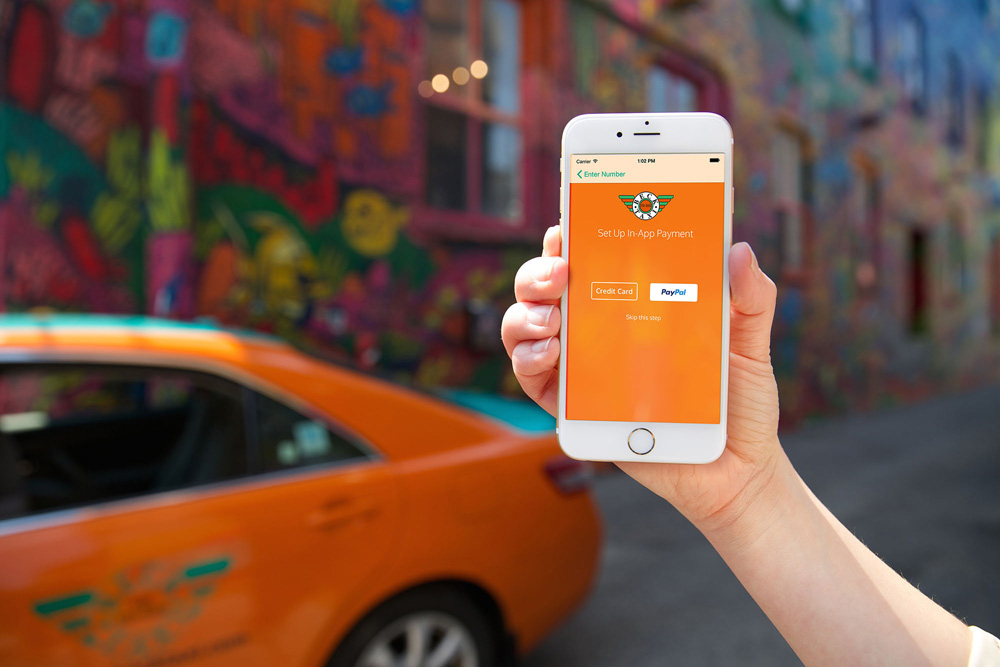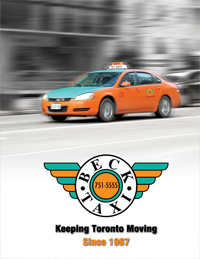Keeping Toronto Moving Since 1967
Written By: Cheryl Long
Produced By: Milos Bulatovic
Transportation in a city as large as Toronto can often be tricky. Whether it’s construction, accidents or sheer volume clogging up the roadways, residents know that getting from point A to B can be a challenge.
For close to 50 years, family-operated Beck Taxi has been chauffeuring passengers to their destinations across the GTA. The collection of familiar orange and green vehicles has grown to become the city’s largest fleet with more than 1,700 taxis available 24 hours a day. In fact, the privately-held company connected eight million passengers with drivers last year, said operations manager Kristine Hubbard, who is not only the granddaughter of company founder Jim Beck but also acts as an advocate for the taxi industry.
In 1967, Beck created his own taxi company after running a small fleet out of Diamond Taxi in Toronto. Starting in the city’s east end with 25 distinctively painted cars, he aimed to offer faster, more efficient service. When Beck died in the 1980s, his daughter Gail Beck-Souter took over the operation that had grown to just under 200 cars. Hubbard ventured into the business as a teenager in the early 1990s, working in the office and learning the business from the ground up.
“I begged for it,” Hubbard said. “I was a young teenager and I was like, ‘Come on, Mom. I can work there. Pretend I’m the call taker and you can be the customer and you’ll see that I can do it.’”
The taxi business soon became Hubbard’s passion. She continued to work while attending York University in Toronto but transferred two years later to the University of Western Ontario in London to separate herself from the business and experience life outside of Beck Taxi. But she later returned to work alongside her mother, the company’s president, and continues her efforts to advance the business amid changes in technology and the industry in general.
Conference sparked need for new app
One of the company’s most significant advances was sparked by Hubbard’s visit to an industry conference in San Francisco in 2011. Technology was the hot topic of conversation at the time, fuelled in part by the fact that app-based Uber had just launched itself in the U.S. city. When Hubbard returned home, she immediately hired a developer and project manager to create a Beck Taxi ordering app, which would allow customers to order a taxi from the convenience of their phone or computer. She felt it was crucial to be first to market with the revolutionary product, and the inaugural version was released in 2012.
“If you’re first, you can just keep making it better,” Hubbard explained. “If some other company comes out first, you’re not going to get (customers) to change.”
For the first time in Canada, the app offered customers the option of paying directly through their mobile device using PayPal. Other features include arrival times, a map view that tracks the ordered taxi, estimated fare calculator and the opportunity to “Rate my Ride”.
But despite the technological advances, what wouldn’t change was the use of two-way radios between dispatch and drivers. Considered old technology by some, Hubbard described the long-standing system as “the backbone of our business”. Still the most widely used technology worldwide, two-way radio communication is unfailingly reliable, ideal in an emergency and can work in tandem with computerization.
“For some reason, there’s an awful misconception about it being ancient and therefore not good,” Hubbard said. “It’s the best thing we have.” Rather than choosing one system over the other, Beck Taxi has integrated the old with the new, designing their own unique dispatch system that offers the best of both worlds.
Uber controversy impacting industry
Recently, the industry has undergone a shakeup with the expansion of Uber in major cities throughout the world. Described as a ride-sharing service, the UberX mobile app allows drivers to use private vehicles to pick up fare-paying passengers. Uber has been operating in Toronto using professional drivers for about three years, Hubbard said, but last year the company launched its UberX platform that allows non-professional drivers to pick up passengers at a lower cost than the original service.
The City of Toronto attempted to shut down the company this summer, but the effort was dismissed in a ruling by an Ontario Superior Court judge. In the meantime, a class-action lawsuit has been filed against Uber and UberX on behalf of taxi and limousine owners and drivers in Ontario.
“It’s not as complicated as people want to make it,” Hubbard explained. “Uber does the same thing that Beck Taxi does. Uber connects riders with drivers and that’s exactly what we do. You can call it a dispatch company, you can call it a facilitator, a service; the bottom line is in no other industry would a government tolerate a multi-billion-dollar company entering a regulated market and refusing to follow the rules.”
It’s an emotionally charged topic in the taxi industry, and one that Hubbard feels strongly about as she advocates for the drivers who keep Beck Taxi’s fleet on the roads day in and day out. Beck-Souter taught her daughter early on that the company’s drivers weren’t employees; they were customers to be appreciated and respected. Just as passengers are not obligated to ride with Beck Taxi, their drivers are not held by any sort of contract. If they drive for Beck Taxi, it’s because they choose to do so and that has put an onus on Hubbard to keep the company operating as smoothly and profitably as possible.
“I think there’s a respect for each other in this industry that maybe not everybody gets to see, and my mom has started this,” she said. “We want to raise the image of taxi drivers. (Drivers) are professionals and should be respected; they’re doing an honourable job and they keep this city moving.”
Drivers keep the city mobile
When there are problems with public transit or winter storms create hazardous conditions, taxi drivers are still on the roads ensuring that passengers get to their destinations. “…they’ll stay out there on those crazy winter nights,” Hubbard said. “I think…people need to hear their stories and see their faces and understand this is your neighbour.”
That dedication to customer service, whether for passengers or drivers, is one of the reasons Beck Taxi has been named Favourite Taxi Company for the past 20 years by the Toronto Sun Reader’s Choice awards. They also support several charitable organizations and sports teams, and save the prime “real estate” on their cars to increase publicity for fundraising initiatives. Many of the causes they support revolve around the use of alcohol, ensuring that revellers arrive home safely after special events held throughout the city.
“We’re always looking for different ways to help,” Hubbard said. “We are in the community so to avoid participating in it just doesn’t make any sense.”
To learn more about Beck Taxi, visit becktaxi.com.







